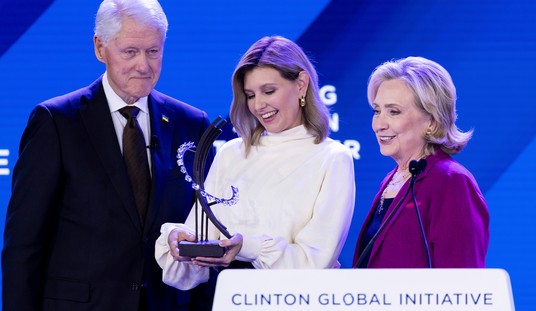The White House decided to crack down on the Saudis after the assassination of Jamal Khashoggi, and not just those directly involved in it. ABC News reports that the administration has imposed sanctions on the 15 men identified by the Saudis as the hit team that carried out the murder — prompted in large part by the Turks and their intelligence efforts. However, the addition of two others may be intended to send a message to the House of Saud:
The Trump administration has sanctioned 17 Saudi officials for their alleged involvement in the killing of Washington Post columnist Jamal Khashoggi, the first economic penalties from the U.S. over the brutal murder that has spawned a diplomatic crisis.
The 17 individuals, the U.S said, are the 15-man hit squad that traveled to Turkey to carry out the operation, the Saudi consul general in Istanbul, Turkey, where the killing took place, and a senior adviser to Crown Prince Mohammed bin Salman.
It’s the same list of people that the Saudis themselves have blamed and arrested for the killing, which the Saudi government at first denied, then called an accident, before labeling it a rogue operation.
With the sanctions, the U.S. freezes all assets for the men and blocks any U.S. persons from doing business with them. While that’s unlikely to make much of a difference with the group all imprisoned in Saudi Arabia, the sanctions do send a message that the U.S. takes the issue seriously.
The Saudi prosecutor in the Khashoggi case also announced that he would seek the death penalty against five of the defendants, another attempt to show a seriousness of purpose. At the same time, however, he also let the crown prince off the hook:
Saudi Arabia’s public prosecutor released the results of a long-awaited investigation into the death of journalist Jamal Khashoggi on Thursday, saying that a team of Saudi agents who had been dispatched to Istanbul with orders to bring him home alive had instead killed the journalist and dismembered his body.
Saudi Arabia’s crown prince had no knowledge of the operation, Shaalan al-Shaalan, a spokesman for the prosecutor, said during a news conference in Riyadh, the Saudi capital.
He said that 11 suspects had been indicted and that the authorities were seeking the death penalty for five of them. The order to kill Khashoggi, who had criticized the Saudi monarchy over the last year, had come from the leader of the Saudi team in Istanbul, Shaalan said, without naming any of the suspects.
Prosecutor Saud al-Mojeb’s conclusion — that the murder was authorized by a minor official — contradicted assertions by Turkey’s president, Recep Tayyip Erdogan, who has said that the orders to kill Khashoggi had come from “the highest levels of the Saudi government,” without specifying exactly who was responsible.
Well, that’s mighty convenient, isn’t it? Still, the White House makes clear that it’s not entirely buying the Saudis’ explanation that this was an interrogation attempt that went rogue. The Washington Post identifies the other two men as close advisers to Crown Prince Mohammed bin Salman, the man on whom considerable suspicion rests as the real author of the plot. Their inclusion on the list certainly looks like a signal of displeasure and suspicion, although the Saudis have already tossed both under the bus:
Among the differences between the U.S. and Saudi statements issued Thursday, Treasury’s account appeared to indicate a planned killing, while the Saudi prosecutor indicated the order to kill Khashoggi was made on the spot by one of the agents who had been sent to bring him back to Saudi Arabia.
The prosecutor’s version of events was similar to an earlier Saudi statement saying that the agents had been ordered only to persuade or force Khashoggi, a contributing columnist for The Washington Post who has written critically of the ruling monarchy, to return to Saudi Arabia.
The order, it said, was issued by Ahmed al-Assiri, a former deputy head of intelligence and close aide to Mohammed. The prosecutor said that Saud al-Qahtani, another senior adviser to the crown prince, was also involved in planning Khashoggi’s repatriation.
The New York Times, on the other hand, sees this as a step toward pushing the story to the background. It comes as the White House hopes to salvage a major arms sale to Saudi Arabia, one concern on which Donald Trump has been vocal all along:
Although the new Saudi explanation of the killing, as well as the associated charges, appeared to contradict previous statements from both the Saudi government and senior Trump administration officials, the twin announcements in Riyadh and Washington may be part of an ongoing effort in both capitals to put the case behind them.
In Riyadh, the hope is that the latest explanation will protect Crown Prince Mohammed bin Salman from growing questions about whether he is suited to rule. In Washington, the Trump administration is hoping to forestall congressional proposals to restrict arms sales to or military operations with Riyadh, which have arisen in large part because of growing fury at the humanitarian crisis in Yemen during a Saudi-led military campaign there.
Interestingly, the sanctions will be applied through the Global Magnitsky Act. That was a 2016 expansion of the 2012 Magnitsky Act, which was aimed specifically at Russia after tax accountant Sergei Magnitsky was beaten to death in a Russian prison, put there after trying to blow the whistle on massive tax fraud in Vladimir Putin’s government. It was that law which prompted the infamous Trump Tower meeting between Natalia Veselnitskaya, Donald Trump Jr, Jared Kushner, and Paul Manafort in June 2016.
Unless the Turks have more they can release, this looks like it’s as far as the US wants to pursue this. King Salman seems unprepared to boot his favorite son from the role of crown prince, perhaps an indication of just how well MbS has consolidated power within the royal family. With few options for effective partnerships in the region, the US is stuck with the Sauds as they are — and the Sauds are stuck with us, too.








Join the conversation as a VIP Member